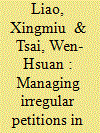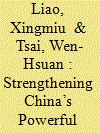| Srl | Item |
| 1 |
ID:
165223


|
|
|
|
|
| Summary/Abstract |
This paper uses Province A and City T as case studies to explore the strategies used by the Chinese Communist Party (CCP) for managing citizens’ “irregular letters and visits” (irregular petitions) and the logic behind them. We believe that the local officials use both “hard” and “soft” measures to exercise control over these activities. The soft measures include persuasion and negotiation aimed at getting petitioners to abandon their irregular petitions. The hard measures involve the use of the coercive power of the state to compel the petitioners to return home. During important political meetings and holiday periods, both of which are popular times for petitioning, the CCP is more likely to take a hard approach to resolve serious problems and maintain stability. In normal times, it generally uses less costly soft tricks. These two social control strategies are utilized alternately by the CCP to maintain social stability and guarantee its regime survival.
|
|
|
|
|
|
|
|
|
|
|
|
|
|
|
|
| 2 |
ID:
165222


|
|
|
| 3 |
ID:
176602


|
|
|
|
|
| Summary/Abstract |
On becoming paramount leader, Xi Jinping, with the assistance of Wang Qishan, augmented the powers of the Commission for Discipline Inspection (CDI), the body charged with investigating wrongdoing by government and Party employees. To consolidate his power, Xi merged a number of different departments into a “great system of supervision and investigation,” known as the National Supervisory Commission (NSC). The CDI acts as the core body of the NSC, and it scrutinizes cases of corruption and malfeasance in coordination with relevant departments. The most important aspects of this process are “placing a case on file” (li’an) and “detention” (liuzhi). This article seeks to throw light on the CDI’s investigation process through extensive fieldwork carried out in County J.
|
|
|
|
|
|
|
|
|
|
|
|
|
|
|
|